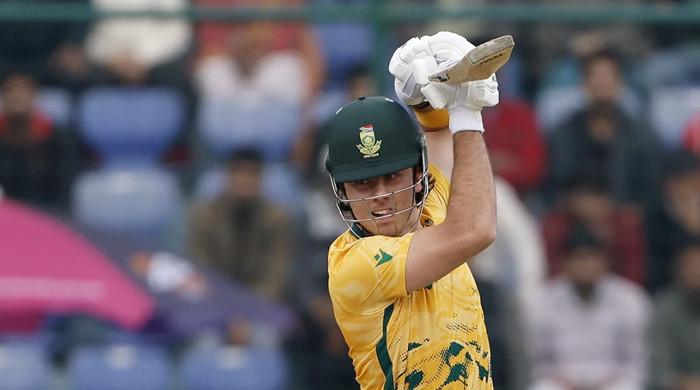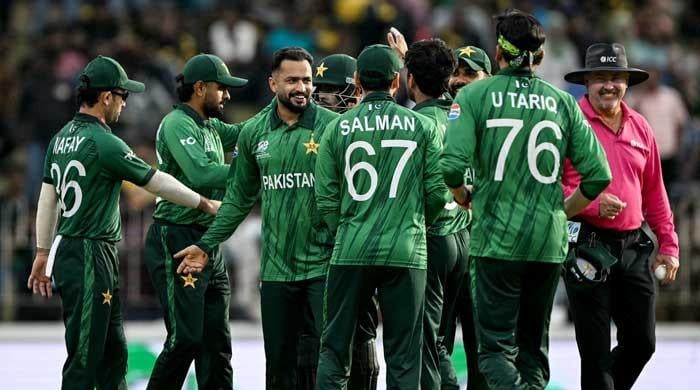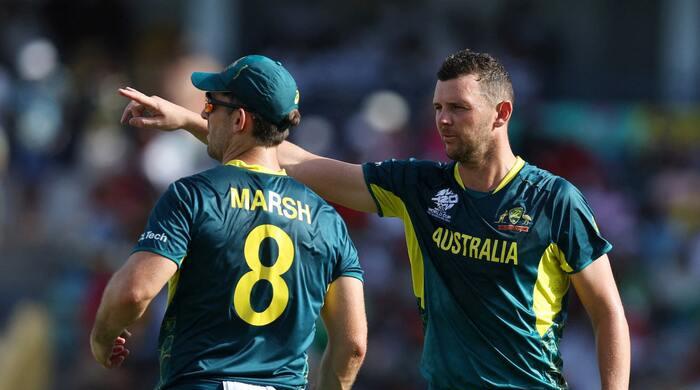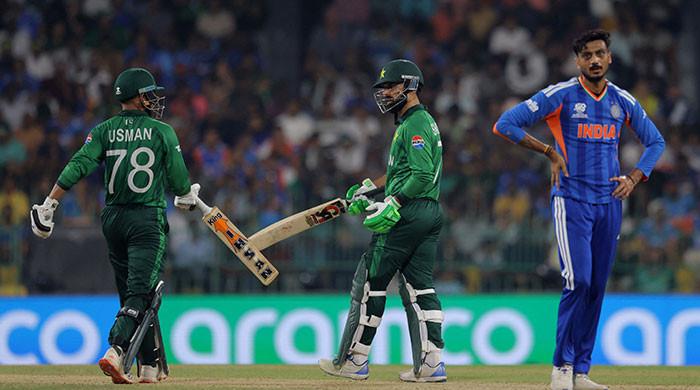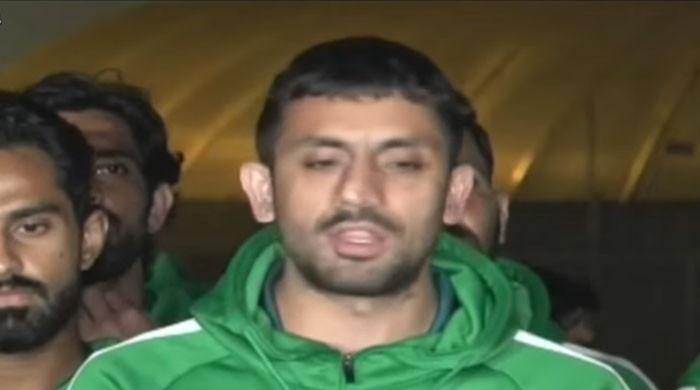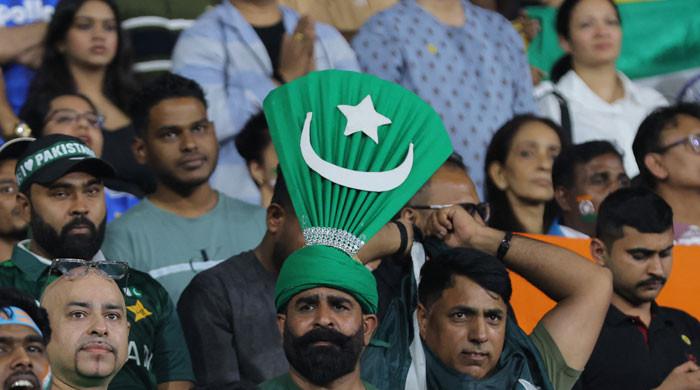Down memory lane: Pakistan’s memorable Tests in West Indies
What better way to bid farewell to Misbah and Younis than a Test series win against Windies?
April 19, 2017
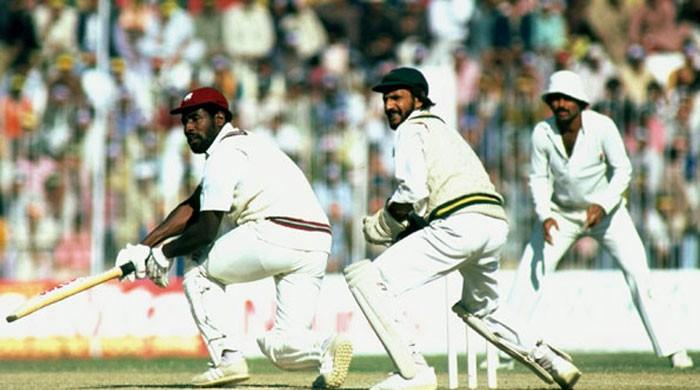
Pakistan are all set to face West Indies for a three-Test series starting this Friday, April 21. They have never won a series in the Caribbean, but this could be their best chance.
Pakistan captain Misbah-ul-Haq wants to make his last trip memorable before he hangs up his boots, and so does veteran batsman Younis Khan, who will retire after this series as well. Not to mention, the team needs a desperate win to put the ‘blunder down under’ behind.
Pakistan have played some memorable matches in West Indies over the years. The very first match between the two sides turned out to be remarkable. The first Test at Bridgetown, Barbados is still remembered for the longest ever innings played in Test cricket by ‘Little Master’ Hanif Muhammad. It was January 1958; Pakistan faced a deficit of 473, after being wrapped up for 106 in their first innings. With solid concentration, Hanif not only stayed on the wicket for over three days, but was also involved in century partnerships with all the top four batsmen, including debutant Saeed Ahmed and his elder brother Wazir Muhammad.
In the final Test at Port-of-Spain, Pakistan won by an innings due to Wazir Muhammad’s brilliant innings of 189. Fazal Mahmood and Nasim-ul-Ghani took eight wickets each in the match. Fazal restricted the home team to 268, by taking 6 wickets in the first innings. Wazir Muhammad shared partnerships of over 150 with Saeed Ahmed and Hanif Muhammad to put on a huge score. In reply to Pakistan’s score of 496, West Indies were dismissed for 227 as Nasim-ul-Ghani took six wickets this time. The victory kept Pakistan’s ‘away’ record intact of winning at least one Test when on tour.
The next time Pakistan toured the West Indies was in Feb-Apr 1977. The series belonged to the left-handed batsman Wasim Raja, who was amazing in the series. In the first Test at Barbados, he scored a century against the likes of Colin Croft and Joel Garner, who were making their debut. In the next innings, he was again required to fend off the attack. Along with wicket-keeper Wasim Bari, Raja put on 133 runs for the last wicket to avert defeat.
The third Test at Georgetown belonged to Majid Khan, who registered his highest Test score of 167 and the best bowling figures of his career: 4/45. The match ended in a draw as the home team failed to score 287 runs in the few hours. Pakistan leveled the series by winning the fourth Test at Port-of-Spain. The third of the Muhammad brothers, Mushtaq scored a hundred and captured 5 wickets in an innings to play an important role in the win. Wasim Raja scored a marvelous 70 and with three wickets was by his skippers’ side to ensure a victory by 266 runs.
Pakistan lost the final Test at Sabina Park, Kingston by 140 runs, losing the series. Wasim Raja, with his 517 runs, was the third highest scorer of the series after Gordon Greenidge (537) and Majid Khan (530), but with a better batting average. He also set a record of most sixes, 14, in a Test series, which after 40 years, is still intact.
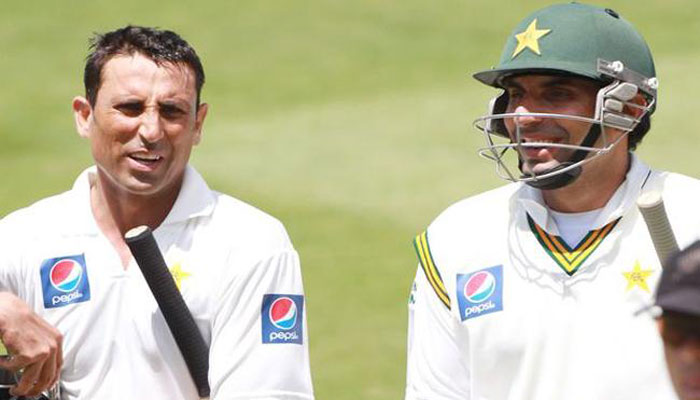
The West Indies Test series will be the last time Misbah and Younis are seen in action in international cricket
Pakistan went to West Indies in March 1988. Imran Khan, who retired after the World Cup in November 1987, was requested by then president of Pakistan Zia-ul-Haq to return as captain. The three-match series was drawn, and was marred by umpiring controversies, as was the previous tour.
The first Test at Georgetown was convincingly won by Pakistan, owing to 11 wickets by Imran Khan and Miandad’s century against the West Indies. It was Javed’s first Test century against the former World Champions. ‘Viv’ Richards and Malcolm Marshall were not part of the squad and this helped Pakistan to inflict West Indies a defeat at home for the first time since 1978.
In the second Test at Port-of-Spain, with the return of the stalwarts, Pakistan managed to play out a draw. ‘Viv’ Richards and ‘Jeff’ Dujon registered centuries. The umpires also played their part. Needing 372 for victory, Pakistan were close with Miandad’s second hundred of the tour. With the 9th wicket falling on the first ball of the last over of the day, Pakistan decided to call off the chase, and leg spinner Abdul Qadir survived the last five balls to deny the home team a win.
The last Test, between the two best teams of those days, ended with a series-leveling win for the hosts. Pakistan set a target of 266 for the home side, who were in trouble at 207/8. The home umpires turned a blind eye on a couple of occasions and the ninth wicket was able to scamper home.
The same happened when Pakistan toured West Indies in 1999/2000. This was the last time they played a three-Test series in West Indies. With two Tests drawn, the final Test was gifted to the home team by the umpires. One of them was Billy Doctrove, a West Indian umpire later involved in the infamous ‘The Oval Test’ fiasco in 2006. In Antigua Test, Doctrove gave Inzamam out controversially when the big man was batting superbly at 68, and later turned down a confident caught-behind appeal from Wasim Akram at the closing stages of the match, allowing West Indian captain Jimmy Adams to continue. With DRS years away, New Zealand’s Doug Cowie, the other umpire, denied a bat-pad claim of last man Courtney Walsh off Saqlain Mushtaq. West Indies won the match by a wicket and took the series.
Since then, Pakistan haven’t played a three-match series, and the current tour, under Pakistan’s most successful captain Misbah-ul-Haq, is the best opportunity to do something which has alluded them in the past.




